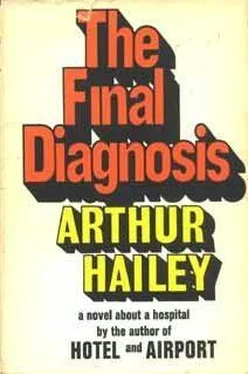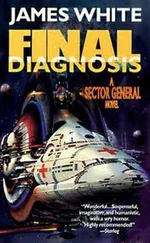Arthur Hailey - The Final Diagnosis
Здесь есть возможность читать онлайн «Arthur Hailey - The Final Diagnosis» весь текст электронной книги совершенно бесплатно (целиком полную версию без сокращений). В некоторых случаях можно слушать аудио, скачать через торрент в формате fb2 и присутствует краткое содержание. Жанр: Триллер, на английском языке. Описание произведения, (предисловие) а так же отзывы посетителей доступны на портале библиотеки ЛибКат.
- Название:The Final Diagnosis
- Автор:
- Жанр:
- Год:неизвестен
- ISBN:нет данных
- Рейтинг книги:4 / 5. Голосов: 1
-
Избранное:Добавить в избранное
- Отзывы:
-
Ваша оценка:
- 80
- 1
- 2
- 3
- 4
- 5
The Final Diagnosis: краткое содержание, описание и аннотация
Предлагаем к чтению аннотацию, описание, краткое содержание или предисловие (зависит от того, что написал сам автор книги «The Final Diagnosis»). Если вы не нашли необходимую информацию о книге — напишите в комментариях, мы постараемся отыскать её.
The Final Diagnosis — читать онлайн бесплатно полную книгу (весь текст) целиком
Ниже представлен текст книги, разбитый по страницам. Система сохранения места последней прочитанной страницы, позволяет с удобством читать онлайн бесплатно книгу «The Final Diagnosis», без необходимости каждый раз заново искать на чём Вы остановились. Поставьте закладку, и сможете в любой момент перейти на страницу, на которой закончили чтение.
Интервал:
Закладка:
His thoughts were brought back to the present by Orden Brown. The chairman was telling O’Donnell, “There’ll be a good deal of social activity, of course, once the campaign gets going. Oh, and something else. I believe it would be a good thing, Kent, if we put you in as a speaker at the Rotary Club. You could tell them what the new building will do, our plans for the future, and so on.”
O’Donnell, who disliked public meetings, especially the regimented bonhomie of service clubs, had been about to grimace but checked himself. Instead he said, “If you think it will help.”
“One of my people is on Rotary executive,” Orden Brown said. “I’ll have him fix it up. That had better be the opening week of the campaign. Then the following week we might do the same thing with Kiwanis.”
O’Donnell considered suggesting that the chairman leave him some time for surgery, otherwise he might have trouble meeting his own quota. But he thought better of it.
“By the way,” Orden Brown was saying, “are you free for dinner the day after tomorrow?”
“Yes, I am,” O’Donnell answered promptly. He always enjoyed the quiet, formal dignity of dinner at the house on the hill.
“I’d like you to come with me to Eustace Swayne’s.” Seeing O’Donnell’s surprise, the chairman added, “It’s all right—you’re invited. He asked me if I’d tell you.”
“Yes, I’ll be glad to come.” All the same, the invitation to the home of the board of directors’ most die-hard member was unexpected. Naturally O’Donnell had met Swayne a few times but had not come to know him well.
“As a matter of fact, it’s my suggestion,” Brown said. “I’d like you to talk with him about the hospital generally. Let him absorb some of your ideas if you can. Frankly, at times he’s a problem on the board, but you know that, of course.”
“I’ll do what I can.” Now that he knew what was involved, O’Donnell did not relish the thought of getting close to board politics. So far he had managed to steer clear of them. But he could not say no to Orden Brown.
The chairman picked up his brief case and prepared to leave. Tomaselli and O’Donnell rose with him.
“It will be just a small party,” Orden Brown said. “Probably half a dozen people. Why don’t we pick you up on the way across town? I’ll phone before we leave.”
O’Donnell murmured his thanks as, nodding pleasantly, the chairman went out.
The door had scarcely closed on Orden Brown when tall, slim Kathy Cohen, Tomaselli’s secretary, came in. “I’m sorry to interrupt,” she said.
“What is it, Kathy?”
She told the administrator, “There’s a man on the phone who insists on talking to you. A Mr. Bryan.”
“I’m busy with Dr. O’Donnell now. I’ll call him back.” Tomaselli sounded surprised. Normally he would not have to tell Kathy anything so elementary.
“I told him that, Mr. Tomaselli.” She sounded doubtful. “But he’s very insistent. He says he’s the husband of a patient. I thought you ought to know.”
“Maybe you should talk with him, Harry.” O’Donnell smiled at the girl. “Take him off Kathy’s mind. I don’t mind waiting.”
“All right.” The administrator reached for one of his two telephones.
“It’s line four.” The girl waited until the connection was made, then went back to the outer office.
“Administrator speaking.” Tomaselli’s tone was friendly. Then he frowned slightly, listening to what was coming from the other end of the line.
O’Donnell could hear the receiver diaphragm rattling sharply. He caught the words, “Disgraceful situation . . . imposition on a family . . . should be an inquiry.”
Tomaselli put his hand over the phone’s mouthpiece. He told O’Donnell, “He’s really boiling. Something about his wife. I can’t quite make put . . .” He listened for a moment more, then said, “Now, Mr. Bryan, supposing you start at the beginning. Tell me what this is all about.” He reached for a pad and pencil, then said, “Yes, sir.” A pause. “Now tell me, please, when was your wife admitted to hospital?” The phone rattled again and the administrator made a swift note. “And who was your physician?” Again a note. “And the date of discharge?” A pause. “Yes, I see.”
O’Donnell heard the words, “Can’t get any satisfaction,” then Tomaselli was talking again.
“No, Mr. Bryan, I don’t remember the particular case. But I will make some inquiries. I promise you that.” He listened, then answered, “Yes, sir, I do know what a hospital bill means to a family. But the hospital doesn’t make any profit, you know.”
O’Donnell could still hear the voice on the telephone, but it sounded calmer, responding to Tomaselli’s conciliatory approach. Now the administrator said, “Well, sir, it’s the physician who decides how long a patient remains in hospital. I think you should have another talk with your wife’s physician, and what I’ll do meanwhile is have our treasurer go over your bill, item by item.” He listened briefly, then, “Thank you, Mr. Bryan. Good-by.”
He hung up the phone, tore off the page of notes, and put it in a tray marked “Dictation.”
“What was the trouble?” O’Donnell asked the question casually. In a busy hospital complaints about service and charges were not unique.
“He claims his wife was kept in too long. Now he has to go into debt to pay the bill.”
O’Donnell said sharply, “How does he know she was in too long?”
“He says he’s checked around—whatever that means.” Tomaselli said thoughtfully, “It may have been necessary, of course, but she was here nearly three weeks.”
“So?”
“Normally I wouldn’t think much about it. But we’ve had an unusual number of these complaints. They’re not always as strong as this—but on the same lines.”
Something flashed through O’Donnell’s mind: the word Pathology. Aloud he said: “Who was the attending physician?”
Tomaselli glanced at his notes. “Reubens.”
“Let’s see if we can get him and clear this up now.”
Tomaselli touched an intercom set. “Kathy,” he said, “see if you can locate Dr. Reubens.”
They waited in silence. From the corridor outside they could hear a soft voice on the hospital public-address system. “Dr. Reubens. Dr. Reubens.” After a moment the phone buzzed. Tomaselli lifted the receiver and listened. Then he passed it to O’Donnell.
“Reub? It’s Kent O’Donnell.”
“What can I do for you?” O’Donnell could hear the thin, precise voice of Reubens, one of the senior surgeons, at the other end of the line.
“Do you have a patient”—he looked at Tomaselli’s notes which the administrator had pushed toward him—“a Mrs. Bryan?”
“That’s right. What’s the matter? Has her husband been complaining?”
“You know about it then?”
“Of course I know about it.” Reubens sounded annoyed. “Personally I think he has good reason to complain.”
“What’s the story, Reub?”
“The story is that I admitted Mrs. Bryan for possible carcinoma of the breast. I removed a tumor. It turned out to be benign.”
“Then why keep her here for three weeks?” As he asked, O’Donnell remembered that you always had to go through this question-and-answer performance with Reubens. The other man seldom volunteered information.
Now he answered, “You’d better ask Joe Pearson that!”
“Be simpler if you told me, Reub.” O’Donnell was quietly insistent. “After all, she’s your patient.”
There was a silence. Then the thin, clipped voice said, “All right. I told you the tumor was benign. But it was two and a half weeks before I found out. That’s how long it took Pearson to get it under his microscope.”
Читать дальшеИнтервал:
Закладка:
Похожие книги на «The Final Diagnosis»
Представляем Вашему вниманию похожие книги на «The Final Diagnosis» списком для выбора. Мы отобрали схожую по названию и смыслу литературу в надежде предоставить читателям больше вариантов отыскать новые, интересные, ещё непрочитанные произведения.
Обсуждение, отзывы о книге «The Final Diagnosis» и просто собственные мнения читателей. Оставьте ваши комментарии, напишите, что Вы думаете о произведении, его смысле или главных героях. Укажите что конкретно понравилось, а что нет, и почему Вы так считаете.












